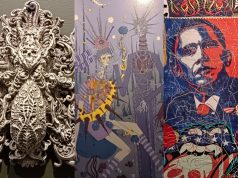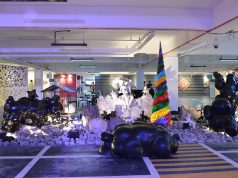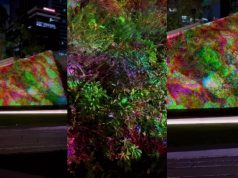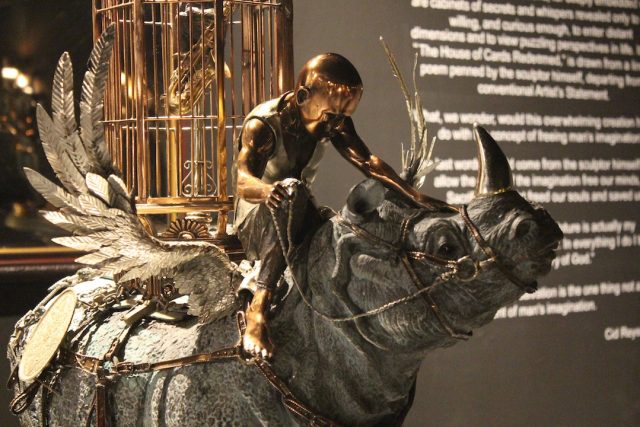
Fantasy meets harsh reality at Art Fair Philippines, where sculptures of winged trumpets and crocodile candelabras are hidden behind curtains, and photos of weeping wives and bloodied corpses crowd each other in a darkened room.
It is the sixth run of the annual affair at The Link carpark in Ayala Center, Makati, where visitors get a feel of the contemporary art scene both here and abroad.
They can gape at the whimsical sculptures in Daniel dela Cruz’s “Imaginarium”, where insects and beasts are rendered in bronze, silver, and gold. A centaur performs a juggling act, while a man plays the saxophone while sitting on a pig. Trumpets spring out of giant beetles’ bodies, and lamps sprout from octopuses’ heads.
Visitors can also step inside Plet Bolipata’s “Little Red Riding Hood in Central Park”, where rabbits in crocheted cloaks perch on a piano and dollhouses shelter wolves pouncing on lonely grandmothers.
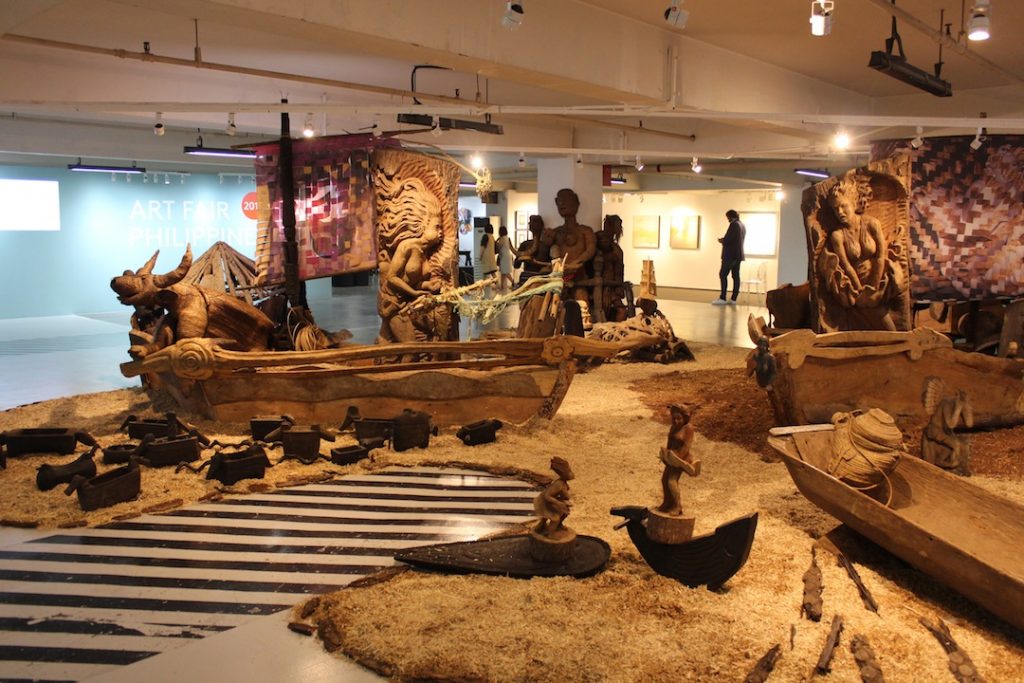
Kidlat Tahimik’s “WW3-the Protracted Kultur War” is another sight to behold. Two ships are in a face-off, with one carrying Ifugao goddess Inhabian, and another bearing Hollywood icon Marilyn Monroe. Nearby, a smaller vessel floats on a sea of wood chips, where a man trains his video camera on the scene.
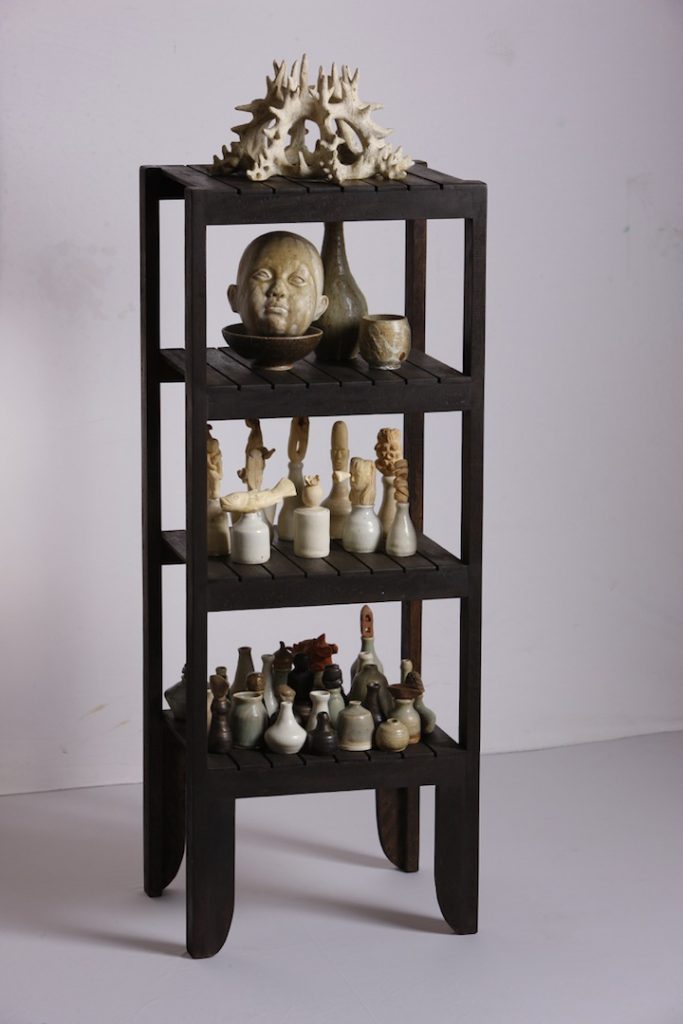
“Escritorio: Letters to My Younger/Future Self” is a prompt to consider at CANVAS’ booth, where 21 artists flip through their memories and share some reminders. Sculptor Salvador Alonday tackles that rite of passage for boys: circumcision, while Dale Erispe says, “Grow beyond the border.”
A must-see are Emmanuel Garibay’s paintings, which are filled with figures and events that clash and cohabitate in the Philippine setting.
“Takas” depicts a novena-praying grandmother, a naked family of three, a Communist rebel, a pot-bellied politician, and a Muslim man on their commute in a jeep. Murals of Christ, a bikini-clad beer endorser, a basketball star, and the Virgin Mary decorate the roof.
Other familiar figures can be found in “Ikalawang Milenyo”, “Katapat”, and “Manangmana ng Tagapagmana”: policemen resting on barricades, Ronald McDonald, cardinals, Chinese leaders, and evacuees fleeing flooded homes.
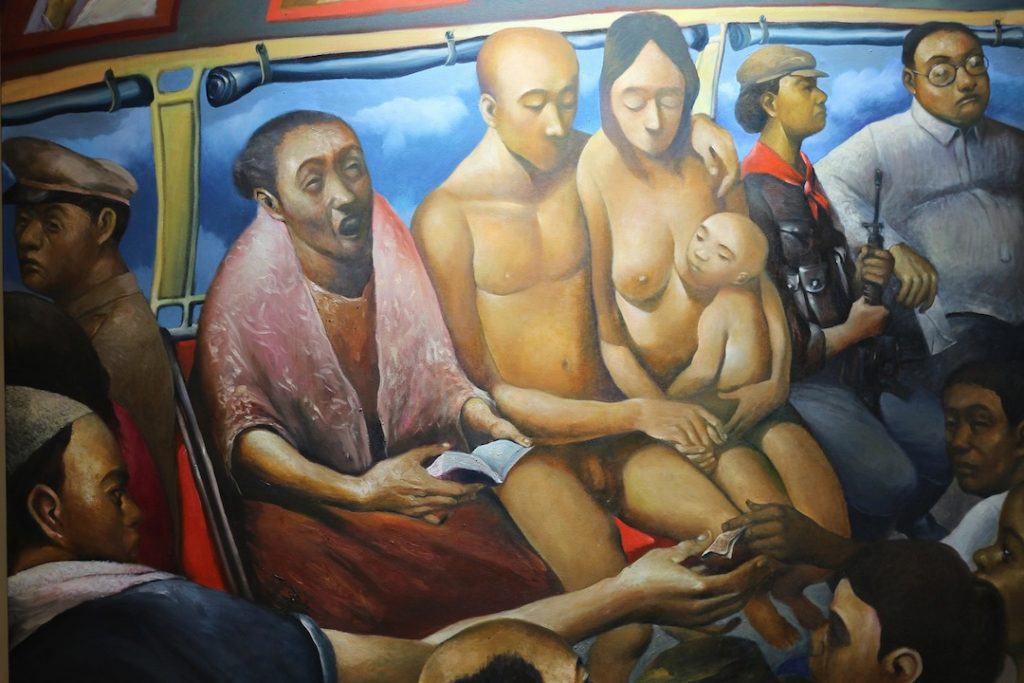
A different experience altogether can be had at the “Ang Mga Walang Pangalan” exhibit, named after poet Jose F. Lacaba’s ode to Leonor Alay-ay, the driver of labor leader Rolando Olalia. The two were tortured and killed nine months after the EDSA revolution toppled the dictatorship of Ferdinand Marcos.
The booth features an entire wall of photos Carlo Gabuco took while covering the drug war from July 2016 to January this year. In the center of the room is a sofa borrowed from a victim’s home, where one can sit and listen to a recording of a child recounting how she saw her parent killed. Composer John Miguel Sobrepeña simulated the sound of a gas chamber to add to the chilling atmosphere.
Gabuco remembers his first coverage in Paco, Manila, where a man was killed in a buy-bust operation. He snapped picture after picture without processing anything, then rushed to another incident in front of the Senate in Pasay City. The body was left on the sidewalk, the first Gabuco saw with the head wrapped in packing tape.
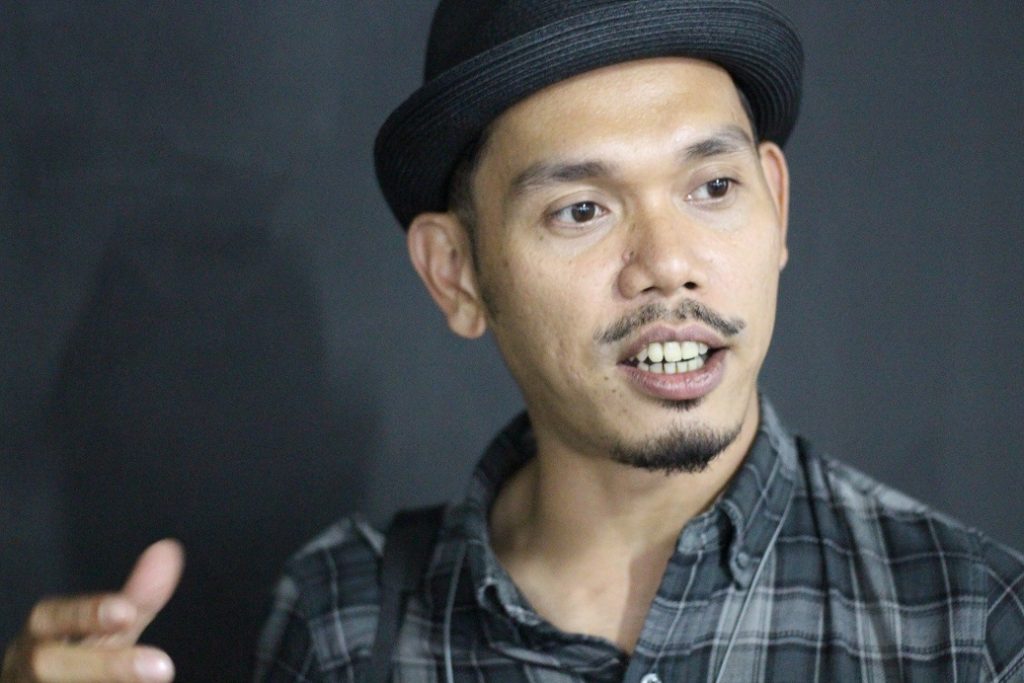
Responding members of the Scene of the Crime Operatives (SOCO) cut through the tape – Gabuco had mistakenly thought this would be done at the morgue – and suddenly the man had a face.
“I was so stirred. And you could see how the guy struggled. When he was being wrapped in tape, he was still alive, I guess. Because his face was really… His mouth was open, probably he suffocated to death, and I remember he had ice pick wounds on the side of the neck,” Gabuco recalled.
There was a cardboard sign next to the victim: “‘Wag tularan, drug pusher and carnapper ako (Don’t be like me, I’m a drug pusher and car thief).”
The night wasn’t over yet. There was another body discarded along Roxas Boulevard. The victim’s face was also wrapped with tape, and the same sign was found on the scene.
“I’m scared for this generation, if the culture of violence becomes acceptable where, since you’re bad, it’s okay that you’ll be killed,” Gabuco said. “I really do hope that there will be accountability, that the people who incited the war will be held accountable.”
Art Fair Philippines runs until March 4. Student rate is Php150; Php100 for those from Makati. IDs will be inspected. Ordinary ticket price is Php350.
Entrances are at 10 a.m. to 1:30 p.m.; 2 p.m. to 5 p.m.; and 5:30 to 9 p.m. For more details, check the Art Fair Philippines website or ArtFairPH on Facebook.





